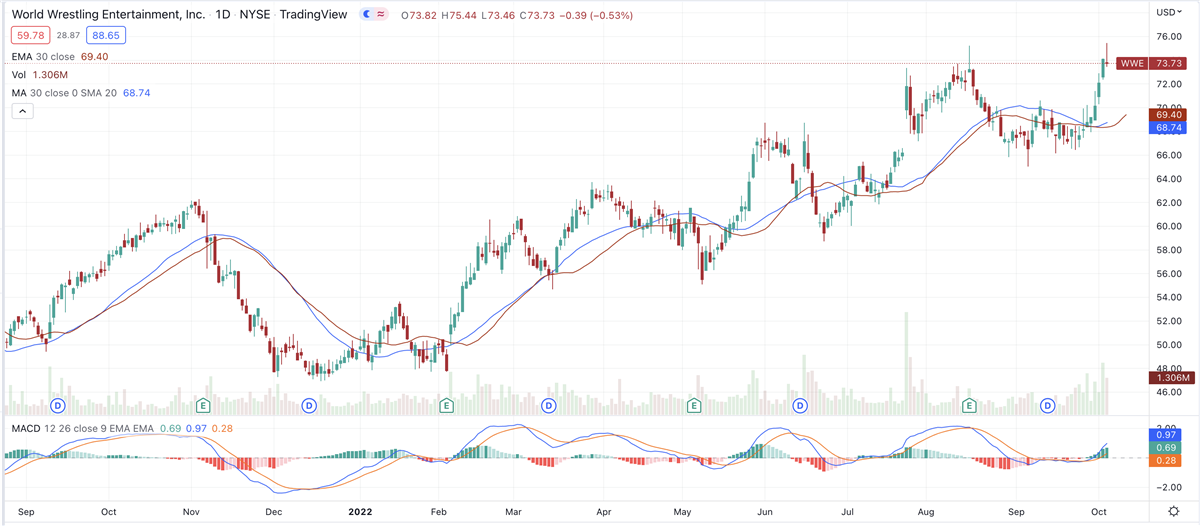Will WWE Shares Wrestle Their Way Higher or Will They Tap Out? Mid-cap World Wrestling Entertainment Inc. briefly cleared a price consolidation Wednesday. The company recently boosted Q3 and full-year income guidance.
By Kate Stalter
This story originally appeared on MarketBeat

Media and entertainment mid-cap World Wrestling Entertainment Inc. (NYSE: WWE) has been trying to grapple its way out of a price consolidation that began in mid-August as a broader market rally tapped out. On Tuesday, WWE rallied to its highest closing price in over three years. Along with Liberty Media's three tracking stocks, Liberty SiriusXM Group (NASDAQ: LSXMA), Formula One Group (NASDAQ: FWONA) and The Liberty Braves Group (NASDAQ: BATRA), WWE has been outpacing the majority of stocks.
Widely held media stocks such as Walt Disney (NYSE: DIS) and Sony Group (NYSE: SONY) have been underperforming WWE and the Liberty Media properties. 
Connecticut-based WWE has a market capitalization of $5.51 billion. It's a component of the S&P 400 mid-cap index, tracked by several ETFs, including the SPDR Portfolio S&P 400 Mid Cap ETF (NYSEARCA: SPMD).
WWE has had three quarters in a row of earnings increases and five quarters of revenue growth despite corporate distractions, such as the departure of WWE CEO and founder Vince McMahon. His separation from the company was labeled "retirement," though it occurred amid allegations of sexual misconduct and the discovery of $19.6 in unrecorded expenses attributed to McMahon. Following McMahon's exit, his daughter, Stephanie McMahon, and Nick Khan were named co-CEOs. Stephanie's husband, Paul "Triple H" Levesque, a former wrestler, was named chief content officer last month. He had already been in creative and marketing roles with the company and will assume some of the creative tasks Vince McMahon had previously handled.
The executive shuffles led to speculation that the company may be setting itself up for a sale, although nothing has been formally announced.
A new chief executive (or two) may initially lead to stock-price volatility as there's uncertainty about the company's strategic direction. However, it often means there's a breath of fresh air, with stale initiatives (or scandals) being ushered out and new, high-potential projects being launched.
Since the new CEOs stepped into the arena, the stock is up nearly 51% year-to-date with a three-month gain of 18.67%.
The company reported second-quarter results on August 16. Earnings came in at $0.59 per share, up 40% from the year-earlier quarter and topping analysts' views by $0.03. Revenue of $328 million also exceeded expectations, according to MarketBeat data. That was a 24% increase on the top line.
WWE raised its full-year guidance, saying it now expects operating income before depreciation and amortization (OIBDA) between $370 to $385 million, up from previous guidance of $360 to $375 million.
"This range of anticipated performance reflects the continued ramp-up of live events, including large-scale international events and increased monetization of content, partially offset by increased production," the company said in the earnings release.
For the third quarter, which ended on September 30, WWE now expects adjusted OIBDA to fall in a range between $70 million and $80 million. It's expected to report third quarter results on November 15, with Wall Street eyeing earnings of $0.47 per share on revenue of $276.81 million.
The company has been growing its international business by forging streaming partnerships with Disney and Comcast's (NASDAQ: CMCSA) NBCUniversal, among others.
According to MarketBeat analyst data, the consensus rating on WWE is "hold," with a price target of $77.80, a 4% upside.
On Wednesday, the stock initially moved higher, defying the broad-market pullback. However, WWE ended the session lower, declining $0.39, or 0.53%, to $73.73.
It cleared its previous structure high of $75.23 shortly before 1 p.m. Eastern, then retreated. It's not uncommon to stocks pass a potential buy point and then pull back. Market conditions at the moment don't support the notion of jumping into a breakout with high conviction the stock will continue advancing.










